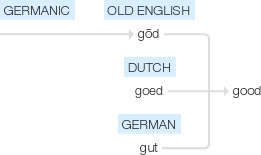Good
Old English gōd, of Germanic origin; related to Dutch goed and German gut .
wiktionary
From Middle English good, from Old English gōd, from Proto-West Germanic *gōd, from Proto-Germanic *gōdaz, from Proto-Indo-European *gʰedʰ-(“to unite, be associated, suit”). Cognate with Russian го́дный(gódnyj, “fit, well-suited, good for; (coll.) good”), год(god), "year", via "suitable time". Not related to the word god.
From Middle English goode(“good, well”, adverb), from the adjective. Compare Dutch goed(“good, well”, adverb), German gut(“good, well”, adverb), Danish godt(“good, well”, adverb), Swedish godt(“good, well”, adverb), all from the adjective.
From Middle English good, god, from Old English gōd(“a good thing, advantage, benefit, gift; good, goodness, welfare; virtue, ability, doughtiness; goods, property, wealth”), from Proto-Germanic *gōdą(“goods, belongings”), from Proto-Indo-European *gʰedʰ-, *gʰodʰ-(“to unite, be associated, suit”). Compare German Gut(“item of merchandise; estate; property”).
From Middle English goden, godien, from Old English gōdian(“to improve, get better; make better; endow, enrich”), from Proto-West Germanic *gōdōn(“to make better, improve”), from Proto-Germanic *gōdaz(“good, favourable”).
From English dialectal, from Middle English *goden, of North Germanic origin, related to Swedish göda(“to fatten, fertilise, battle”), Danish gøde(“to fertilise, battle”), ultimately from the adjective. See above.
etymonline
good (adj.)
Old English gōd (with a long "o") "excellent, fine; valuable; desirable, favorable, beneficial; full, entire, complete;" of abstractions, actions, etc., "beneficial, effective; righteous, pious;" of persons or souls, "righteous, pious, virtuous;" probably originally "having the right or desirable quality," from Proto-Germanic *gōda- "fitting, suitable" (source also of Old Frisian god, Old Saxon gōd, Old Norse goðr, Middle Dutch goed, Dutch goed, Old High German guot, German gut, Gothic goþs). A word of uncertain etymology, perhaps originally "fit, adequate, belonging together," from PIE root *ghedh- "to unite, be associated, suitable" (source also of Sanskrit gadh- "seize (booty)," Old Church Slavonic godu "favorable time," Russian godnyi "fit, suitable," Lithuanian goda "honor," Old English gædrian "to gather, to take up together").
Irregular comparative and superlative ( better, best) reflect a widespread pattern in words for "good," as in Latin bonus, melior, optimus.
Sense of "kind, benevolent" is from late Old English in reference to persons or God, from mid-14c. of actions. Middle English sense of "holy" is preserved in Good Friday. That of "friendly, gracious" is from c. 1200. Meaning "fortunate, prosperous, favorable" was in late Old English. As an expression of satisfaction, from early 15c. Of persons, "skilled (at a profession or occupation), expert," in late Old English, now typically with at; in Middle English with of or to. Of children, "well-behaved," by 1690s. Of money, "not debased, standard as to value," from late 14c. From c. 1200 of numbers or quantities, "large, great," of time or distance, "long;" good while "a considerable time" is from c. 1300; good way "a great distance" is mid-15c.
Why then, can one desire too much of a good thing. ["As You Like It"]
As good as "practically, virtually" is from mid-14c.; to be good for "beneficial to" is from late 14c. To make good "repay (costs, expenses), atone for (a sin or an offense)" is from late 14c. To have a good mind "have an earnest desire" (to do something) is from c. 1500. Good deed', 'good works were in Old English as "an act of piety;" good deed specifically as "act of service to others" was reinforced early 20c. by Boy Scouting. Good turn is from c. 1400. Good sport, of persons, is from 1906. The good book "the Bible" attested from 1801, originally in missionary literature describing the language of conversion efforts in American Indian tribes. Good to go is attested from 1989.
good (n.)
Old English god (with a long "o"), "that which is good, a good thing; goodness; advantage, benefit; gift; virtue; property;" from good (adj.). Meaning "the good side" (of something) is from 1660s. Phrase for good "finally, permanently" attested from 1711, a shortening of for good and all (16c.). Middle English had for good ne ylle (early 15c.) "for good nor ill," thus "under any circumstance."
